Garden Tools/Implements Name & Images | Necessary Vocabulary
Garden Implements/Tools
Garden implement / ˈgɑːrdn ˈɪmplɪmənt / (ˈগাঃর্ডন্ ˈইমপ্লিমএন্ট) n [a garden implements/tools are any one of many tools made for gardens and gardening and the range of tools made for agriculture and horticulture] (<বাগানের কাজে বাবহৃত> হাতিয়ার/অস্ত্র): Garden implements can also be hand tools and power tools.
Garden Tool Related Necessary Vocabulary Note
Ø Garden / ˈgɑːrdn / (ˈগাঃর্ডন্) n {USA yard} [a piece of land next to or around your house, where flowers and other plants are grown, and often containing a lawn (=an area of grass)] (বাগান; বাগিচা; উদ্যান): Raju unwound the hose and watered the garden.
Water / ˈwɑːtər / (ˈওআঃটএর্) v {Pt. Pp. watered / ˈwɑːtərd / (ˈওআঃটএর্ড্)} [to pour water onto plants or the soil that they are growing in] (<গাছপালাতে> পানি ছিটিয়ে দেওয়া): I have asked my neighbor to water the plants while I am away. The roses need watering.
Ø Implement / ˈɪmplɪmənt / (ˈইমপ্লিমএন্ট্) n 1. [a tool which works by being moved by hand or by being pulled across a surface and that is quite simple] (হাতিয়ার; <হাতে কাজ করার>অস্ত্র): Shopkeepers are not supposed to sell knives and other sharp implements to children. Garden/agricultural implements
2. Implement / ˈɪmplɪmənt / (ˈইমপ্লিমএন্ট্) v [to make Sth that has been officially decided start to happen or be used] (কাজে পরিণত করা; বাস্তবায়িত করা): The changes to the national health system will be implemented next year.
<SYN> Carryout
Pull / pʊl / (পুল্) v {Pt. Pp. pulled / pʊld / (পুল্ড্)} [to move something towards yourself, something with great physical effort] (টানা; টেনে তোলা; টেনে নেওয়া): You push and I will pull. Pull the door shut.
 |
| Tool |
Ø Tool / tuːl / (টূল্) n [an instrument such as a hammer, screwdriver, saw, etc. that you hold in your hand and use for making things, repairing things, etc.] (যন্ত্রপাতি): Worker downed tools in protest at poor safety standards in the works, machine tools.
 |
| Instrument |
Instrument / ˈɪnstrəmənt / (ˈইন্ছট্রএমএন্ট্) n [a tool or device used for a particular task, especially for delicate or scientific work] (<বিশেষত সূক্ষ্ণ বা বৈজ্ঞানিক কাজের জন্য>যন্ত্রপাতি): All the instruments are made from glass capillary tubing.
Hammer / ˈhæmər / (ˈহ্যামএর্) n [a tool with a wooden handle and a heavy metal head, used for breaking things or hitting nails] (হাতুড়ি): He struck her on the head with a hammer.
<VERB> Hammer / ˈhæmər / (ˈহ্যামএর্) v {Pt. Pp. hammered / ˈhæmərd / (ˈহ্যামএর্ড্)} [to hit something with a hammer] (হাতুড়ি দিয়ে আঘাত করা; হাতুড়ি মারা): He hammered the nail into the wall. I could hear you hammering upstairs.
Saw / sɔː / (ছো) n [a tool that has a long blade with sharp points (called teeth) along one of its edges which are used for cutting hard materials, such as wood or metal] (করাত): a hand/power/chainsaw
 |
| Saw |
<VERB> Saw / sɔː / (ছো) v {Pt. Pp. sawed / sɔːd / (ছোড্)} [to cut wood or other hard material using a saw] (<কাঠ>করাত দিয়ে কাটা): The workmen sawed and hammered all day.
Ø Down / daʊn / (ডাউন্) v {Pt. Pp. downed / daʊnd / (ডাউন্ড্)} [to cause something or someone to fall to the ground] (ভূপাতিত করা; <নীচে> রেখে/ফেলে দেওয়া): Storms downed trees and power lines. We downed the enemy planes with our missiles.
<IDM> Down tools [(of workers) to stop work; to go on strike] (কর্মবিরতি পালন করা): Worker downed tools in protest at poor safety standards in the works, machine tools
Ø Gardening / ˈgɑːrdnɪŋ / (ˈগাঃর্ডনিঙ্) n [the job or activity of working in a garden, growing and taking care of the plants and keeping it attractive] (বাগানপালন): Many people in Britain are fond of gardening.
 |
| Agriculture |
Ø Agriculture / ˈægrɪkʌltʃər / (ˈএ্যাগরিকালচএর্) n [agriculture is the cultivation of animals, plants, and fungi for food, fiber, biofuel, medicinal plants and other products used to sustain and enhance human life] (কৃষি; কৃষিবিজ্ঞান): The area depends on agriculture for most of its income.
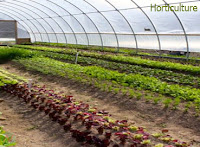 |
| Horticulture |
Ø Horticulture / ˈhɔːrtɪkʌltʃər / (ˈহোর্টিকাল্চএর্) n [horticulture is the branch of agriculture that deals with the art, science, technology, and business of growing plants. It includes the cultivation of medicinal plants, fruits, vegetables, nuts, seeds, herbs, sprouts, mushrooms, algae, flowers, seaweeds and non-food crops such as grass and ornament trees and plants. It also includes plant conservation, landscape restoration, landscape, and garden design, construction and maintenance, and arboriculture. Inside agriculture, horticulture contrasts with extensive field farming as well as fishes and animal husbandry] (উদ্যানপালনবিদ্যা): a college of agriculture and horticulture
Wikipedia
Spade
Spade / speɪd / (স্পেইড্) n [a garden implement with a broad metal blade and long handle, used for digging earth, sand, etc.] (কোদাল): Turn the soil over with a spade. The kids took their buckets<বালতি> and spades to the beach.
 |
| Blade |
Ø Blade / bleɪd / (ব্লেইড্) n [the flat part on a knife or similar tool or weapon, with a very thin, sharp edge or edges for cutting] (<ছোরা, দা, পাখা, কোদাল ইত্যাদির>ফলা; তৃণ ফলা): a tool with a steel blade
Ø Dig / dɪg / (ডিগ্) v {Pt. Pp. dug / dʌg / (ডাগ্)} [to make a hole in the ground or to move soil using a tool, a machine or your hands] (খনন করা; খোঁড়া): They dug deeper and deeper but still found nothing.
Ø Turn / tɜːrn / (টা্র্ন্) v [to move Sth so that it is in a different position or facing a different direction] (উল্টানো): Turn the sweater inside out before you wash it.
Ø Beach / biːtʃ / (বীচ্) n [an area of sand or small stones (called shingle), beside the sea or a lake] (সমুদ্রতীর; সৈকত; বেলাভূমি): tourists sunbathing on the beach
Shovel
Shovel / ˈʃʌvl / (ˈশাভ্ল্) n [a tool with a long handle and a broad blade with curved edges, used for moving loose material such as sand, coal, snow, etc.] (কয়লা, বালু, বরফ, ইত্যাদি সরাবার জন্য কোদাল সদৃশ হাতিয়ার; বেলচা): Workmen with pickaxe and shovels
Ø Curve / kɜːrv / (কা্র্ভ্) n [a line or surface that bends gradually; a smooth bend] (বাঁক; বক্রতা): The driver lost control on a curve and the vehicle hit a tree.
<VERB> {Pt. Pp. curved / kɜːrvd / (কা্র্ভড্)} [a form a curve or move in the shape of a curve] (বেঁকে যাওয়া; বাঁকানো; বাঁক নেওয়া): His lips curved in a laugh. The road curved around the bay.
Ø Edge / edʒ / (এজ্) n [the outside limit of an object, a surface or an area; the part furthest from the center] (প্রান্ত; কিনারা; কিনার): He stood on the edge of the cliff.
Ø Loose / luːs / (লূছ্) adj [not tightly packed together; not solid or hard] (আলগা; খোলা; ঢিলা): loose soil
Trowel
Trowel / ˈtraʊəl / (ˈট্রাউল্) n [a small implement with a curved or flat metal blade, used in the garden for digging small holes and lifting small plants] (খুরপি):
Ø Lift / lɪft / (লিফ্ট্) v {Pt. Pp. lifted / lɪftɪd / (লিফ্টিড্)} [to dig up vegetables or plants from the ground] (<মাটি খুড়ে>গাছ বা শস্য তোলা): to lift potatoes
Sickle
Sickle / ˈsɪkl / (ˈছিক্ল্) n [a tool with a short handle and a curved blade, used for cutting grass and grain crops] (কাস্তে):
Ø Grain / greɪn / (গ্রেইন্) n [the small hard seeds of food plants such as wheat, rice, etc.; a single seed of such a plant] (<শস্য>দানা/কণা <যেমন ধান, গম, ভূট্টা>): Grain production has been falling in recent years. A few grains of rice. Grain crops <দানাদার শস্য>
Hoe
Hoe / hoʊ / (হৌ) n [a garden tool with a long handle and a short blade used to remove weeds and break up the surface of the ground] (নিড়ানি-কোদাল; নিকোদাল):
<VERB> Hoe / hoʊ / (হৌ) v [to break up the soil, remove weeds, etc. with a hoe] (নিড়ানি দেওয়া; নিড়ানো): They spent the afternoon hoeing the vegetable patch.
Ø Weed / wiːd / (উঈড্) n [a wild plant growing where it is not wanted, especially among crops or garden plants] (আগাছা): The yard was overgrown with weeds.
<VERB> Weed / wiːd / (উঈড্) v {Pt. Pp. weeded / wiːdid / (উঈডিড্) } [to take out weeds/wild plants from a place where they are not wanted] (আগাছা তুলে ফেলা; নিড়ানো): I’ve been weeding the flower beds.
Ø Patch / pætʃ / (প্যাচ্) n [a small piece of land, especially one used for growing vegetables or fruit] (<সব্জি বা ফল চাষের জন্য>এক টুকরা জমি): the cabbage patch
Rake
Rake / reɪk / (রেইক্) n [a garden tool with a long handle and long pointed metal parts sticking out in a row at the bottom, used for gathering fallen leaves and making soil smooth] (<আঁকড়া; ঝড়াপাতা, খড় প্রভিতি জড়ো করার জন্য ব্যাবহৃত দাঁতঅলা> আঁকশি):
Ø <PHR-V> Stick out [to go past the surface or edge of something] (<কোনোকিছু থেকে কোনোকিছু>বেড়িয়ে থাকা; অভিক্ষিপ্ত হওয়া): She stuck her tongue out at me <সে আমাকে জিহবা দেখিয়ে ছিল>.
Ø Bottom / ˈbɑːtəm / (ˈবাঃটএম্) n [the lower part of something] (তলদেশ; <একদম>নীচে): I waited for them at the bottom of the hill.
Ø Gather / ˈgæðər / (ˈগ্যাদএর্) v {Pt. Pp. gathered / ˈgæðərd / (ˈগ্যাদএর্ড্)} [to bring things together that have been spread around] (<ছড়িয়ে ছিটিয়ে থাকা কোনোকিছু>জড়ো করা/হওয়া; একএ করা): She gathered up the newspapers that were scattered around the floor.
Pitchfork
Pitchfork / ˈpɪtʃfɔːrk / (ˈপিচ্ফোর্ক্) n [a farm tool in the shape of a large fork with a long handle, and two or three sharp metal points, used especially for lifting and moving hay (=dried grass), or straw] (খড় বা শুকনা ঘাস তোলানামা করার জন্য ব্যবহৃত হাতলওয়ালা কাঁটা লাগানো দণ্ড; কানাইল):
 |
| Hay |
Ø Hay / heɪ / (হেই) n [grass that has been cut and dried and is used as food for animals] (শুকনা ঘাস): They make hay to feed the cattle in winter. A bale of hay
 |
| Straw |
Ø Straw / strɔː / (স্ট্রো) n 1. [the dried yellow stems of crops such as wheat or other grain plants, used as food for animals or as a layer on the ground for animals to lie on, and for making traditional objects] (খড়; পোয়াল): a bale of straw. Straw-colored hair
 |
| Straw |
Straw / strɔː / (স্ট্রো) n 2. [a thin tube made of plastic or waterproof paper that is used to suck liquid into the mouth] (<দুধ, ডাব, কোমলপানীয় পান করার জন্য ব্যবহৃত>নল/চুষনী): Why don’t you drink your milkshake through a straw.
Axe
Axe / æks / (এ্যাক্স) n {US ax} [a tool with a wooden handle and a heavy metal blade, used for chopping wood, cutting down trees, etc.] (কুড়াল; কুঠার): Raju used an ax to chop down the old apple tree.
Ø Chop / tʃɑːp / (চাঃপ্) v {Pt. Pp. chopped / tʃɑːpt / (চাঃপ্ট্)} [to cut something into pieces with an axe, knife or other sharp tools] (<দা, কুড়াল, ইত্যাদি ধারাল অস্ত্র দিয়ে>কুপিয়ে কাটা; টুকরা টুকরা করে কাটা; কোপানো): He was chopping logs for firewood. He was chopping wood in the yard.
Ø <PHR> Cut down [to make Sth fall down by cutting it at the base] (কেটে নামানো): to cut down a tree
Pickaxe
Pickaxe / ˈpɪkæks / (ˈপিক্এ্যাক্স) n [a large heavy tool that has a curved metal bar with sharp ends fixed at the center to a wooden handle. It is used for breaking rocks or hard ground] (দুই পাশে তীক্ষ্ণাগ্র ভারি কুড়াল; খনিত্র; গুতাইল):
Ladder
Ladder / lædər / (ল্যাডএর্) n [a piece of equipment for climbing up and down a wall, the side of a building, etc. consisting of two lengths of wood or metal that are joined together by rungs] (মই): The was up a ladder, cleaning the window.
Ø Equipment / ɪˈkwɪpmənt / (ইˈকোইপমএন্ট্) n [the things that are needed for a particular purpose or activity] (<কাজের> উপকরণ): Never go climbing without the proper equipment
Ø Climb / klaɪm / (ক্লাইম্) v {Pt. Pp. climbed / klaɪmd / (ক্লাইমড্)} [to go up, or to go towards the top of something] (আরোহণ করা; উঁচুতে উঠা): He climbed up the stairs.
Ø <IDM> Up and down [moving upwards and downwards] (উপরে-নীচে): The boat bobbed up and down on the water. My little daughter started jumping up and down with rage when she heard she could not go.
Ø Consist / kənˈsɪst / (কএন্ˈছিছট্) v {Pt. Pp. consisted / kənˈsɪstɪd / (কএন্ˈছিছটিড্)}
<PHR-V> Consist of Sb/Sth [to be formed from the things or people mentioned] (গঠিত হওয়া): Their diet consisted largely of vegetables.
 |
| Rung |
Ø Rung / rʌŋ / (রাঙ্) n [any of the short bars that form the steps of a ladder] (<মইয়ের>ধাপ): He put his foot on the bottom rung to keep the ladder steady.
Stepladder
Stepladder / ˈsteplædər / (ˈস্টেপ্ল্যাডএর্) n [a short ladder that is made of two parts, one with steps, that are joined together at the top, so that it can stand on its own or be folded flat for carrying or storing] (ধাপসিঁড়ি; খাড়া মই):
Billhook
Billhook / ˈbɪlhʊk / (ˈবিলহুক্) n [a tool with a wide blade on top of a short pole used for cutting branches off trees] (দা):
Ø Pole / paʊl / (পৌল্) n [a long thin stick of wood or metal, often used standing straight up on the ground to support things] (খুঁটি): A flag fluttered from a forty-foot pole.
Ø Branch / bræntʃ / (ব্র্যান্চ্) n [a part of a tree that grows out from the main trunk and on which leaves, flowers and fruit grow] (<গাছের>ডাল; প্রশাখা):
Bamboo Basket
Bamboo basket / ˌbæmˈbuː ˈbæskɪt / (ˌব্যামবূ ˈব্যাছ্কিট্) n [a flat, light container, which is make of thin strips of bamboo, woven together and is used for carrying things] (ডালি): Bamboo Basket is used to carrying vegetables, fruits, pulses, grain, sand, and varied other things.
Ø Strip / strɪp / (স্ট্রিপ্) n [a long narrow piece of paper, metal, cloth, etc.] (<লম্বা, সরু>ফালি/টুকরা): a strip of bamboo (=বাঁশের বাতা)
Ø Weave / wiːv / (উঈভ্) v {Pt. wove / waʊv / (); Pp. woven / waʊvn / ()} [to make cloth, a carpet, a basket, etc. by crossing threads or strips across, over and under each other by hand or on machine called a loom] (<সুতা বা বেত দিয়ে>বোনা): The bamboo basket is woven from strips of bamboo.
 |
| Basket |
Ø Basket / ˈbæskɪt / (ˈব্যাছ) n [a light container, often with a handle which is made of thin strips of plastic, wire or wicker woven together and is used for carrying or storing things] (ঝুড়ি; সাজি): The basket is woven from strips of willow.
Shears
Shears / ʃɪrz / (শিএরজ্) n [a garden tool like a very large pair of scissors, used for cutting bushes and hedges] (বড় কাচিঁ): They use electric shears for sheep shearing. A pair of garden shears
Ø Bush / bʊʃ / (বূশ্) n [a plant with many small branches growing either directly from the ground or from a hard woody stem, giving the plant a rounded shape] (ঝোপ; ঝাড়): She was hiding in the bushes at the side of the lane.
 |
| Hedge |
Ø Hedge / hedʒ / (হেজ্) n [a row of bushes or small trees planted close together, usually along the edge of a field, garden/yard or road] (দীর্ঘতরুর সারি): Trim the hedge and collect the trimmings.
Ø Shear / ʃɪr / (শিএর্) v [to cut the wool off a sheep] (<ভেড়ার লোম>ছাঁটা/কাঁটা): The farmer taught her how to shear sheep. Sheep Shearing
Secateurs
Secateurs / ˌsekəˈtɜːrz / (ˌছেকএˈটাঃর্জ্) n {US pruning shears} [a garden tool which has two short, strong, sharp blades, used for cutting plant stems and small branches] (<ডালপালা ছাঁটার জন্য কাচি বিশেষ>কাটারি): a pair of secateurs
Ø Stem / stem / (স্টেম্) n [the main long thin part of a plant above the ground from which the leaves or flowers grow] (<গাছের>ডাটা): There are several leaves on each stem.
Loppers
Loppers / lɑːpərz / (লাঃপএর্জ্) n [loppers are a type of scissors used for pruning twigs and small branches, it has very long handles. They are the largest type of manual garden cutting tool] (লাপার্জ):
Ø Prune / pruːn / (প্রূন্) v [to cut off branches from a tree, bush, etc. so that it will grow better and stronger in future] (<গাছ, ঝোপঝাড় ইত্যাদে ভবিষ্যতে ভাল ফলের জন্য>অংশ বিশেষ ছেঁটে দেওয়া/ছাঁটা): When should you prune apple trees?
 |
| Twig |
Ø Twig / twɪg / (টোয়িগ্) n [a small very thin branch that grows out of a larger branch on a bush or tree] (গাছের ছোট ডাল; উপশাখা; প্রশাখা): We collected dry twigs to start the fire.
Pruning Saws
Pruning saws / prʊnɪŋ sɔːz / (প্রুনিঙ্ ছোজ্) n [they are a type of small saw designed for cutting small to medium-sized branches or for cutting in places that a bow saw cannot fit] (ছাঁট করাত):
Post Hole Digger
Post hole digger / poʊst hoʊl ˈdɪgər / (পৌছট্ হৌল্ ডিগএর্) n [a tool is used to dig narrow holes to install posts, such as for fences and signs] (খোন্তা):
Ø Install / ɪnˈstɔːl / (ইনˈছটোল্) v {~ Sth} [to fix equipment or furniture into position so that it can be used] (<যন্ত্রাদি ব্যবহারে জন্য>সংস্থাপন করা; <খুটি ইত্যাদে>পোতা): The plumber is coming tomorrow to install the new washing machine.
Mattock
Mattock / ˈmætək / (ˈম্যাটএক্) n [a heavy garden tool with a long handle and a metal head, used for breaking up soil, cutting roots, etc.] (কাখোড়া):
Watering can
Watering can / ˈwɔːtərɪŋ kən / (ˈওআটএরিঙ্ কএন্) n [a metal or plastic container with a handle and a long spout, used for pouring water on plants] (সেচনী; <গাছে পানি দেওয়ার> বড় বদনা):
 |
| Spout |
Ø Spout / spaʊt / (স্পাউট্) n [a pipe or tube on a container that you can pour the liquid out through] (তরল পদার্থ নির্গমনের নল বা মুখ <যেমন চা দানি বা বদনার মুখ>): the spout of a teapot
 |
| Pour |
Ø Pour / pɔːr / (পোর্) v [to make a substance flow from a container, especially into another container, by raising just one side of the container that the substance is in] (ঢালা; পাতিত করা): Pour the sauce over the pasta. I spilled the juice while I was pouring it.
Sprinkler
Sprinkler / ˈsprɪŋklər / (ˈস্প্রিঙকলএর্) n [a device sprinkler with holes in that is used to spray water in drops on plants, soil or grass] (<তৃনাবৃত আঙিনায় বা লনে কিংবা বাগানে>পানি ছিটানো যন্ত্র):
Ø Device / dɪˈvaɪs / (ডিˈভাইছ্) n [an object or the small machine which has been invented for a particular purpose] (যান্ত্রিক কল): This device enables deaf people to communicate by typing messages instead of speaking.
 |
| Sprinkle |
Ø Sprinkle / ˈsprɪŋkl / (ˈস্প্রিঙকল) v {Pt. Pp. sprinkled / ˈsprɪŋkld / (ˈস্প্রিঙকল্ড্)} [to drop a few pieces or drops of something over a surface] (<কোনো কিছুর উপর কোনো কিছু> ছড়িয়ে বা ছিটিয়ে দেওয়া): She sprinkled sugar over the strawberries.
Hose
Hose / hoʊz / (হৌজ্) n {UK hosepipe} [a long plastic or rubber pipe, used for putting water onto fires, gardens, etc.] (জলনালী; পানির পাইপ): Raju unwound the hose and watered the garden.
Ø Onto / ˈɑːntə / (ˈআঃনটএ) pre [used with verbs to express movement on or to a particular place or position] (উপরিস্থ কোনোখানে): Move the books onto the second shelf.
Ø Unwind / ˌʌnˈwaɪnd / (ˌআনˈওআইন্ড্) v {Pt. Pp. unwound / ˌʌnˈwaʊnd / (ˌআনওউন্ড্)} [to undo Sth that has been wrapped into a ball or around Sth] (পাক বা প্যাঁচ খোলা): She unwound her scarf from his neck. The bandage gradually unwound and fell off.
Barbed wire
Barbed wire / bɑːrbd ˈwaɪər / (বাঃর্বড্ ˈওআইএর্) n [a type of strong wire with sharp points on it, used to prevent people or animals from entering or leaving a place, especially a field] (কাঁটাতার): a barbed wire fence
Ø Leave / liːv / (লীভ্) v {Pt. Pp. left / left / (লেফট্)} [to go away from a person or a place] (কোনো স্থান ত্যাগ করে যাওয়া): I will be leaving at five o’clock tomorrow. Come on, it’s time we left.
Ø Fence / fens / (ফেন্ছ্) n [a structure which divides two areas of land, similar to a wall but made of wood or wire and supported by posts] (বেড়া; বেষ্টনী):
<VERB> Fence / fens / (ফেন্ছ্) v {Pt. Pp. fenced / fenst / (ফেনছ্ট্)} [to surround or divide an area with a fence] (বেড়া দেওয়া): His property is fenced with barbed wire.
Wheelbarrow
Wheelbarrow / ˈwiːlbæroʊ / (ˈঊঈল্ব্যারৌ) n [a large open container of moving things in, which has a wheel at the front and two handles at the back, used especially in the garden to carry things] (<ছোট>ঠেলাগাড়ি):
Lawnmower
Lawnmower / ˈlɔːnmoʊər / (ˈলোন্মৌএর্) n [a machine for mowing the grass on lawns] (ঘাস কাটা বা ছাঁটার যন্ত্র):
Ø Mow / moʊ / (মৌ) v {Pt. mowed / moʊd / (মৌড্); Pp. mown/mowed} [to cut grass, etc. using a machine or tool with a special blade or blades] (<ঘাস বা ঘাস জাতীয় ফসল>কাটা): I mow the lawn every week in summer.
Ø Lawn / lɔːn / (লোন্) n [an area of ground covered in short grass in a garden/yard or park or used for playing a game on and which is cut regularly to keep it short] (লন; ছোট ঘাসে ঢাকা জমি): Will you mow the lawn at the weekend?
Edger
Edger / ˈedʒər / (ˈএজএর্) n [a tool that is held in the hand and is used for cutting grass which hangs over the edge of a hard surface] (এজার):
Chainsaw
Chainsaw / ˈtʃeɪnsɔː / (ˈচেইনছো) n [a tool made of a chine with sharp teeth set in it that is driven by a motor and used for cutting wood] (চেন-করাত):
Ø Teeth / tiːθ / (টীথ্) n [any of the row of points which stick out from the edge of a tool or piece of equipment, such as a comb, saw or zip] (<করাত, চিরুনি ইত্যা>দাঁত): the teeth on a saw
Gardening gloves
Gardening gloves / ˈgɑːrdnɪŋ glʌvs / (ˈগাঃর্ডনিঙ্ গ্লাভ্ছ্) n [gardening gloves, that protect the hands against cutting thorns and brambles, waterproof gardening gloves for those wet jobs, and flexible gloves for a lighter gardening job] (বাগান-মোজা):
 |
| Thorn |
Ø Thorn / θɔːrn / (থোর্ন্) n [a small sharp-pointed part on the stem of some plants, such as rose] (কাঁটা; কণ্টক):
Ø Bramble / ˈbræmbl / (ˈব্র্যামব্ল্) n [a wild bush with thorns] (বুনো কাঁটা গাছের ঝোপ): We carefully pushed our way through the low bramble.
Ø Flexible / ˈfleksəbl / (ˈফ্লেকছএব্ল্) adj [able to bend or to be bent easily without breaking] (নমনীয়): flexible plastic tubing
English Vocabulary | About Garden & Garden Implements


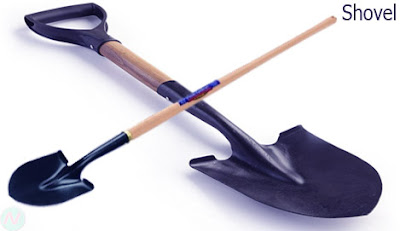
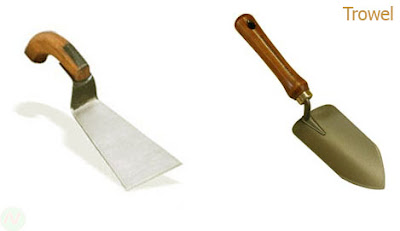
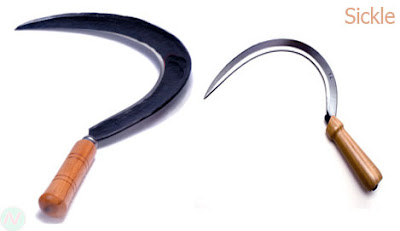











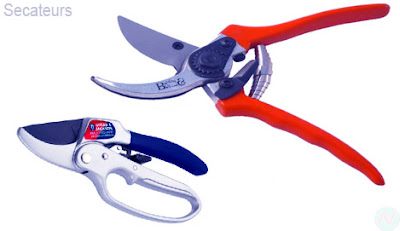







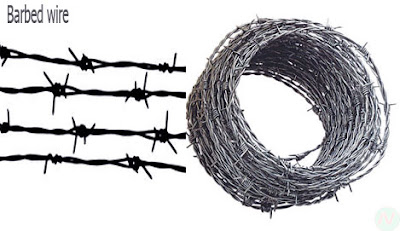















No comments